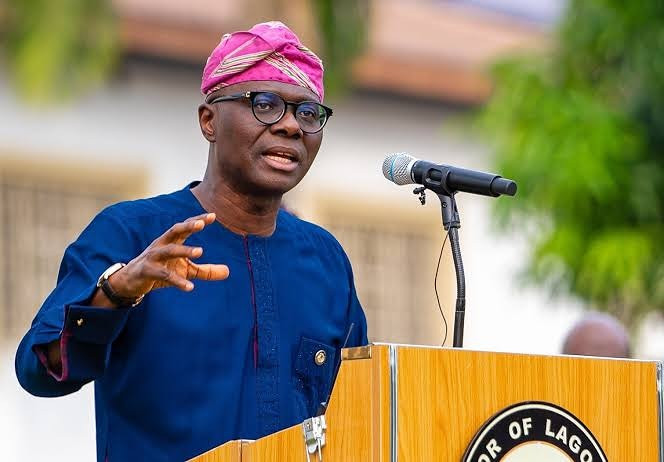I am excited to make history with you all today as we launch Lagos State’s 5-Year Agricultural and Food Security Roadmap.
At the inception of this administration in May 2019, we identified food security as a major policy thrust of this Government and a key component of our T.H.E.M.E.S Agenda. This 5-year Agricultural Roadmap has been designed in line with that Agenda, to reform, transform, and maximize the potential of Lagos State’s Agricultural Sector.
As you all know, Lagos State with a population of 22 million people is Nigeria’s commercial capital but it has the smallest landmass among the 36 States of the Federation. We, therefore, rely on massive food importation from neighbouring States to sustain the food requirements of our teeming population.
We have had to mutually collaborate with other States, to ensure food sustenance in our State – an approach that resonates with global best practices and enables optimal levels of planning, advocacy, funding, and collaboration for agricultural development.
However, we cannot continue to rely exclusively on such alliances. The time is right for us to unlock our immeasurable agricultural potential through the implementation of a 5-year roadmap that will lead to wealth generation, value creation, food security, the industrialization of our agricultural sector and the entrenchment of inclusive socio-economic development.
As a visionary Government, we are committed to optimally developing our potential in food production. The adverse effects of the coronavirus pandemic on food security have necessitated immediate action on ensuring food security for all Lagosians.
With the human and capital resources at our disposal, we should be able to feed ourselves (and even possibly the Nation) by becoming self-sufficient in food production and supply, and engender sustainable growth through the development of the agricultural sector.
The first step towards achieving this is the preparation of a Five-year Agricultural and Food Security Roadmap. Let me, at this juncture, appreciate the leadership of the Ministry of Agriculture for making that promise a reality.
The focus of the 5-Year Agricultural and Food Security Road Map is the development of agricultural value chains where Lagos State has competitive and comparative advantages to enhance the State’s self-sufficiency in food production from 18% to 40% over the next five years, and achieve the Sustainable Development Goals (SDGs) in Lagos State.
In order to successfully implement our 5-year roadmap, we will take a cue from other economies that have achieved self-sufficiency in food production. We will also aim to put the private sector at the heart of our vision for food security in Lagos State, with government as enabler and catalyst.
We are cognizant of the fact that we must formulate policies that can encourage private sector investment in agriculture and we must provide robust market information systems for Agricultural Value Chain actors, for adequate planning and the circumvention of risks and uncertainties.
Our strategies for sustainable Agricultural Development shall focus on the following three (3) pillars:
Growing the upstream sector through interventions by leveraging technologies that are capable of lowering the cost of production of value chains (Fisheries, Poultry, Piggery, Rice, Vegetables and Coconut) with support from donor agencies.
ii. Growing the midstream and downstream sectors (value addition involving: processing, handling, storage, cold chain, packaging, utilization and commercialization) of all important agricultural value chains by leveraging on the huge market with support from donor agencies.
iii. Improving private sector participation by developing and initiating policies that will encourage more private investment in agriculture. This will include linking the private sector with business-friendly credits.
The projection is that the total investment in the Agricultural Sector from the government, private sector, donor agencies and development partners will run into over $10Billion in the next five years. While we expect most of the investment to be private sector-driven, government will continue to provide the needed infrastructure while the private sector will be encouraged to lead the key projects.
The Lagos State 5-Year Agricultural Roadmap is, therefore, the most appropriate tool needed to unleash the capacity of Lagosians to produce the most-consumed agricultural products in the State and to accelerate the establishment of farms and agri-businesses.
On our part, we have started revamping the Agricultural Land Holding Authority (ALHA) to support investment in agriculture. We will also strengthen the coconut belt with increased private sector involvement.
I am greatly encouraged by the interest already generated in the 5-Year Agricultural Roadmap and I hope it will be sustained and backed with concrete action on the part of our development partners and the international community. I assure you that the Lagos State Government is putting in place deliberate incentives to make your investment safe, secure, and profitable.
Ladies and Gentlemen, I am excited about the wealth we will generate from our fecund land and coastal resources. The next five years will be productive, competitive, and transformational as Lagos State implements its agricultural roadmap. We are set to become the nation’s agricultural powerhouse, and I invite you to join us to make history.
Before I end, let me highlight some of the landmark investments and projects that will help us deliver on the Roadmap:
1. The Lagos State Aquatic Centre of Excellence (LACE) which will boost fish production from 20% to 80% and provide employment for over 12,000 fish farmers both directly and indirectly when in full operation;
2. The Imota Rice Mill, which is being funded through the CBN’s ?8Bn concessionary loan. Upon completion, the rice mill will create over 250,000 direct and indirect jobs; and
3. The Lagos Food Production Centre Avia, Igborosu-Badagry and other state-wide agriculture focused initiatives, which will produce 100,000 jobs both directly and indirectly.
Potential and established stakeholders in the agricultural sector are encouraged to partner with us in the aforementioned areas. I urge you to collaborate with us to transform our agricultural sector for food security, wealth generation, poverty eradication, economic diversification, rapid industrialization, and accelerated socio-economic growth.
Distinguished Ladies and Gentlemen, it is my honour to launch the Lagos State 5-year Agricultural and Food Security Roadmap for the benefit of all.
Thank you for your kind attention.
God bless us all.
Igbega Ipinle Eko, Ajumose Gbogbo Wa Ni!
Mr. Babajide Olusola Sanwo-Olu
Governor of Lagos State
Thursday, 22nd April, 2021



 Trending News4 years ago
Trending News4 years ago
 Others3 years ago
Others3 years ago
 Humanity3 years ago
Humanity3 years ago
 Others6 years ago
Others6 years ago
 Business10 months ago
Business10 months ago
 Business5 months ago
Business5 months ago



